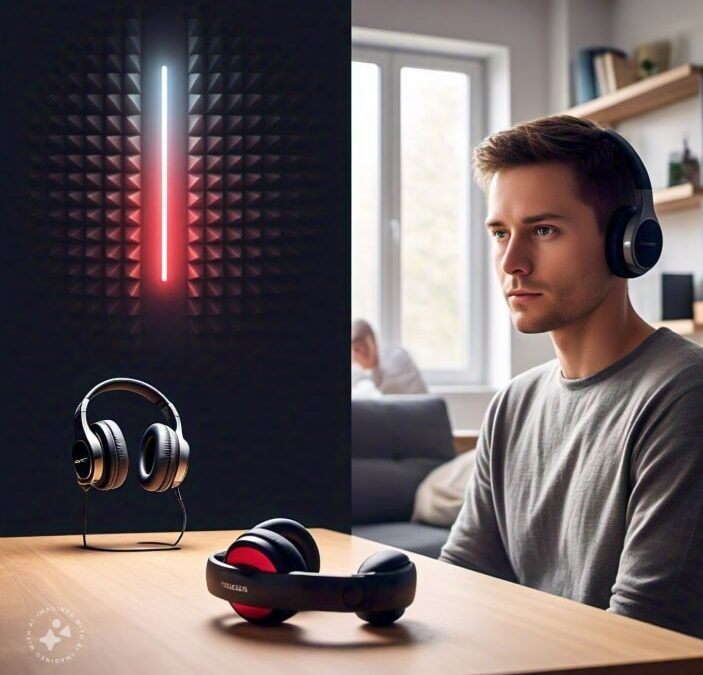Audio is always a priority for headphones users. Could you listen to your music carefully when you are in a crowded place? Ordinary headsets do not allow you to enjoy clear music when you are on a crowded highway or in an office. That is why headphone manufacturers have integrated noise-cancelation technology into their products. But, you might have heard about the terms like active and passive noise cancellation technologies. However, does active noise cancellation differ from passive ones? Explore the detailed differences between active and passive noise canceling headphones.
ANC harnesses advanced sound physics and electronics. On the contrary, PNC depends on precision engineering and advanced materials. Every approach helps you avoid unwanted noise through different mechanisms.
Before choosing active and passive noise canceling headphones and earbuds, understand their differences.
What is Active Noise Cancellation?
ANC works through high-end electronic systems to generate anti-noise signals. The main concept is destructive interference, where the contrasting sound waves work against each other. Active Noise Cancellation generates sound waves, which reflect the incoming noise in reverse direction. So, the noise gets neutralized before your ears hear it.
Earbuds or headphones with active noise cancellation technology have strategically placed tiny microphones that always sample the surrounding environment’s ambient noise. They send the details to a specially designed processor, which checks the incoming sound’s amplitude and frequency. It results in the production of an inverse waveform (the same sound with upside down).
Modern ANC headsets have advanced digital signal processing chips and multiple microphones to operate the complex process.
What is Passive Noise Cancellation?
PNC technology relies on acoustic engineering and physical barriers to block the surrounding noise. Unlike the active system, PNC needs no electronic components and power. But, it uses only particular design elements and materials to make a good sound barrier between the environment and your ears. There are multiple defense layers against audio transmission. Memory foam and other dense materials are used to ensure sound absorption. They convert sound energy into heat through friction.
The PNC earbuds manufacturers provide ear tips of different sizes made from foam or silicone. Make sure the tips fit in your ear canal snugly to avoid sound leakage.
Active versus Passive Noise Cancelling Headphones
What is the difference between active and passive noise cancelling headphones? A few factors will help you know the major differences.
Which is More Effective?
ANC headphones are the best choice if the surrounding environment has low-frequency sounds. You may use them when you are in
- Buses
- Airplane cabins
- Busy workplace
Advanced sound wave systems work effectively to remove the noises. So, ANC headsets allow you to avoid noises and listen to music comfortably.
Passive noise canceling headphones are the right choice for those who want to eliminate high-frequency sounds. They will save you from any disturbance from traffic noises and conversations. Only the earcup material creates the physical barrier to block out the annoying noise.
Which Needs Power?
Most ANC earbuds are battery-operated devices, so batteries are the source of power for noise-cancelling technology. Thus, before starting a long trip, you should keep these devices charged.
On the contrary, headphones with PNC technology need no power to continue their function. As they are independent of power, they are useful almost in any situation.
Which is Costlier?
As ANC headphones and earbuds are costlier because of their complex design and modern technology. They come with components like electronic circuitry and microphones.
But, PNC headphones are more affordable and have a simple design.
Which Provides Audio Quality?
The anti-noise creation process produces a slight hiss when triggered. However, you may not find this issue if you have purchased high-end models. If the ANC process affects the audio quality, audiophiles may not be highly pure.
On the contrary, PNC headphones’ working principles involve electronic processing. They deliver more natural audio that has no impact on artifacts of the technology.
Which is More Comfortable?
ANC headphones are weightier because of the additional internal components. During your long music-listening sessions, you may feel discomfort.
But, PNC headphones are lighter because they have batteries and electronic parts.
Which Noise Cancellation Technology is Better for Your Purpose?
To decide on the better noise cancellation technology for your headphones, you should focus on a few factors.
- Where do you like to use your earbuds and headphones? ANC is more suitable if you frequently travel by train or airplane. However, if occasional noise is an issue, PNC is the best technology.
- Do you prioritize audio quality? If you want more accurate audio, buy PNC earbuds. ANC sometimes affects the audio profile. But, modern ANC headphones do not have these issues.
- Do you have a tight budget? ANC earbuds are costlier than PNC models.
Conclusion
The brief guide on active and passive noise canceling headphones will help you make a decision. Most consumers ask- Is active noise canceling better than passive? ANC headphones are best for users in public transport or offices. But, passive noise cancellation headsets have physical barriers to eliminate external noise. They are more cost-effective and need no power. Casual listeners may invest in low-maintenance models. ANC headphones are best for frequent commuters and travelers.
FAQ
Which noise cancelation technology is more comfortable?
Active Noise Cancellation efficiently minimizes noise but some users experience discomfort or mild pressure in their ears. It leads to ear fatigue when you use the headphones for long hours. But, PNC earbuds will not cause this pressure. So, they are best for your prolonged use.
Do active noise cancelation headphones work during phone calls?
No. The active noise canceling process does not work during your phone calls. The microphones essential for the ANC pick up your voice when you make phone calls. It affects their potential to detect and eliminate background noise.

